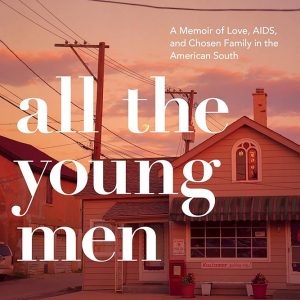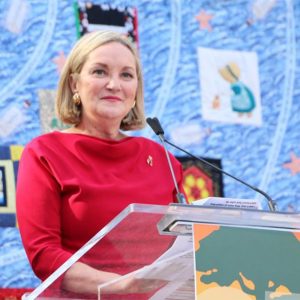calsfoundation@cals.org
Ruth Coker Burks (1959–)
Ruth Burks is an Arkansas woman who, in the midst of the 1980s AIDS epidemic, provided support for dozens of men who were dying of AIDS—men who were often abandoned by their families, with even some health professionals being reluctant to treat them. According to Burks, she also ensured that they would have a proper final resting place, providing for the burial of dozens of men in Files Cemetery. However, later investigation into her story has raised significant doubts about the narrative she has promoted about herself.
Frances Ruth Coker was born in Hot Springs (Garland County) on March 19, 1959, to James Isham Coker and Aline Lawlor Coker. Her father, who was almost twenty years older than her mother, served in both World War I and World War II. During Coker’s earliest years, her mother was hospitalized with tuberculosis for an extended period of time, leaving her father to attend to his infant daughter. They developed a close relationship, but he died in 1964 when Ruth was five. Still struggling with her own health, her emotionally distant mother sometimes put Coker in a local children’s home. Following graduation, Coker attended the University of Arkansas at Little Rock, earning a degree in speech and communication. She married a man she later called “a bully,” and the couple divorced after five years; they had a daughter, Allison. Ruth Burks was living with her daughter in Hot Springs when she first got involved with victims of AIDS.
In 1984, she was visiting the University Hospital in Little Rock (Pulaski County), where she was helping care for a friend suffering from cancer. Through the course of her friend’s five surgeries, Burks spent a lot of time in hospitals and witnessed nurses literally drawing straws to determine who would go into the room to check on AIDS-ravaged patients. The rising fear within society led the hospital to limit information about who was being treated there and for what disease. However, as Burks had a gay cousin in Hawaii, she had sought to learn as much as she could about the disease, even though her cousin downplayed its seriousness.
As Burks has recalled, one day, on a hospital visit to her friend, she entered the room of a dying AIDS patient. She spoke with the patient, and after he asked for his mother, Burks went to the nurses and conveyed his request. They dismissed it, saying that his mother would not come, introducing Burks to the family abandonment that was so often a part of the dying men’s experiences. When she reentered the room and took his hand, the delirious patient gratefully murmured that he knew his “Mama would come.” Burks returned to visit this patient, who soon died. After his death, Burks contacted numerous funeral homes, but she was spurned. Finally, she found one establishment in Pine Bluff (Jefferson County) that agreed to cremate the body, and she paid for it from her own savings. With the ashes in a cardboard box, she got a chipped cookie jar from a friend who worked at Dryden Pottery in Hot Springs, and with that as an urn, she went to Files Cemetery in Garland County. (According to the story Burks has widely told, her mother had gotten into a major battle with her brother when Burks was young and methodically bought all 262 of the empty plots in Files Cemetery, where the family had historically been buried, in an effort to prevent her brother and his family from being interred with the rest of the family.)
Using a post hole digger, she dug a hole in her father’s plot, buried the remains, prayed, and then returned home. Recognizing how many of the patients were alone, Burks became a constant presence at the hospital and took it upon herself to see that when they died they were cremated and the ashes properly taken care of. She continued to work with the funeral home in Pine Bluff, and once the bodies had been cremated, she took the ashes to Files Cemetery for proper interment. Burks and her daughter conducted funeral services themselves after efforts to get priests or ministers to preside were met with resistance.
As word of her efforts—the willingness to engage with dying patients, the calls to families on their behalf—spread, she became the go-to person in Arkansas for the care and comfort of dying AIDS patients. Over the course of more than a decade, Burks has stated, she cared for more than 1,000 AIDS patients and carried out an estimated forty-three burials. She always made a last effort to connect the dying with their families but usually to no avail. While her early efforts had been funded from her own savings, as word of her work spread, she received considerable funding assistance for funerals and medications from gay dance clubs around the state, such as Discovery in Little Rock. Indeed, Burks accumulated her own pharmacy, stocked in large part with AZT and antibiotics that people had left behind when they died.
From the mid-1980s until the mid-1990s, when the development of better HIV drugs as well as more enlightened medical care for AIDS patients essentially left Burks without anyone to help, she cared for hundreds of dying people. Despite a lack of medical experience or training, she took those suffering from AIDS to their appointments, picked up their medications, assisted in filling out applications for assistance, and served as a human contact. She has recalled sitting with dying men as they filled out their own death certificates, since she knew she could not get the requisite information—such as a mother’s maiden name—from their families.
When Bill Clinton was elected president, Burks served as a White House consultant on AIDS education. She moved to Florida in the later part of the 1990s, working as a funeral director and a fishing guide.
Burks suffered a stroke in 2010, an event that may have been hastened by the stress of her work on behalf of the patients she helped. She made a strong recovery and returned to Arkansas, settling in Rogers (Benton County) to be nearer her grandchildren. Meanwhile, she remained an outspoken advocate for better understanding of HIV and AIDS. In 2013, she appeared on television to speak on behalf of three disabled foster children in Pea Ridge (Benton County) who had been suspended from school because the superintendent had heard that someone in the family had AIDS. After her appearance, Burks was told that a job she had been offered was no longer available.
Burks became more widely known thanks to a 2015 profile in the Arkansas Times, written by David Koon, which was later picked up by Out magazine. In 2016, she was honored by Broadway Sings for Pride and New York City Pride Week. She was also interviewed by both National Public Radio and the BBC. Actress and activist Rose McGowan directed and produced a short video, Ruth, that was released in 2017. Her memoir, All the Young Men, was published in 2020, and she soon began working with film producers on a project based on her life. She was grand marshal of the 2021 Fayetteville Pride Parade.
Burks expressed hopes of developing a memorial at Files Cemetery, displaying the names of the men buried there, and turning the site into a place where people could meditate and reflect. However, 2021 reports by both the Arkansas Times and Today have called into question the narrative Burks has given the media. A GoFundMe campaign for the purpose of developing a memorial was launched by New York resident Travis Dubreuil in 2015, raising $75,000 before being paused in 2017, with no apparent work on the monument having yet been undertaken; Burks acknowledged spending at least some of the money on medical expenses, and GoFundMe later launched an investigation into the use of the money. In addition, the Files family publicly questioned Burks’s alleged ownership of those cemetery plots, insisting that the site was deeded over to the county long before Burks’s mother could have purchased any plots. Others have asked Burks to provide the names of the approximately forty men she buried in the cemetery, but she has yet to produce a complete list. In late 2022, however, Burks arranged for a monument, featuring a sitting angel figure, to be installed within the cemetery.
For additional information:
Amstutz, Andrew, Jess Porter, and Phoenix Smithey. “The Making of the Arkansas Cemetery Angel: AIDS Activism, Care Work, and Fragmentary Archives in the Life of Ruth Coker Burks.” Southern Spaces, January 28, 2025. https://southernspaces.org/2025/making-arkansas-cemetery-angel-aids-activism-care-work-and-fragmentary-archives-life-ruth-coker-burks/ (accessed November 10, 2025).
Bailey, Austin. “Ruth Coker Burks and the Missing Monument.” Arkansas Times, July 8, 2021. https://arktimes.com/arkansas-blog/2021/07/08/ruth-coker-burks-and-the-missing-monument (accessed May 17, 2023).
Burks, Ruth Coker, with Kevin Carr O’Leary. All the Young Men. New York: Grove Press, 2020.
Cocozza, Paula. “The Aids Angel: How Ruth Coker Burks Comforted Dying Gay Men.” The Guardian, February 3, 2021. https://www.theguardian.com/society/2021/feb/03/aids-angel-ruth-coker-burks-dying-gay-men (accessed May 17, 2023).
“Episode Three: A Cemetery Angel.” Oxford American Points South Podcast, October 17, 2019. https://oxfordamerican.org/web-only/episode-three-a-cemetery-angel (accessed May 17, 2023).
Hines, Gary. “Ruth Coker Burks.” Arkansas Democrat-Gazette, February 2, 2020, pp. 1D, 5D. Online at https://www.arkansasonline.com/news/2020/feb/02/ruth-coker-burks-20200202/ (accessed May 17, 2023).
Kacala, Alexander. “Doubts Surround Viral Story of ‘AIDS Angel’ Who Says She Helped Hundreds of Dying Men.” Today, October 28, 2021. https://www.today.com/health/doubts-surround-viral-story-aids-angel-who-says-she-helped-t236351 (accessed May 17, 2023).
Koon, David. “Ruth Coker Burks, the Cemetery Angel.” Arkansas Times, January 8, 2015. Online at https://arktimes.com/news/cover-stories/2015/01/08/ruth-coker-burks-the-cemetery-angel (accessed May 17, 2023).
William H. Pruden III
Ravenscroft School


 All the Young Men
All the Young Men  Ruth Burks
Ruth Burks 



Very proud of Ms. Burks. God bless her and her family for helping AIDS victims.